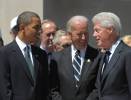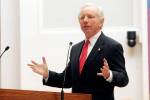Time to act was yesterday, but today will have to do
President Barack Obama got cheers in Las Vegas on Tuesday when he announced the purpose of his quick visit: "I'm here today because the time has come for common-sense, comprehensive immigration reform."
Actually, for many in the crowd - activists and immigrants alike - it's long past time for common-sense, comprehensive immigration reform. In fact, didn't we do this about 26 years ago, when President Ronald Reagan signed into law a bill that provided amnesty for immigrants then in the country illegally?
Nobody in the audience at Del Sol High School was willing to look a gift horse in the mouth, however. In fact, the sense of excitement at the prospect of a bipartisan deal was almost palpable.
Just in case, Obama promised that if Congress got bogged down in the details of a plan endorsed by a group of four Republican senators and four Democrats, he'd send his own bill to Congress and demand a swift vote.
But the fact is, prospects for a deal are looking good. Democrats have long wanted such a plan, and Republicans - who have at various times shouted down members who embraced the idea - have seen the light since the 2012 elections. President Obama won about 70 percent of the Latino vote last year, according to exit polls.
In principle, the president and the senators are not very far apart.
Obama says he wants to strengthen border security, although he acknowledged there are more Customs and Border Protection agents guarding America's southern border than at any time in history. Illegal crossings have dropped by nearly 80 percent, although some of that is clearly due to the recession and its impact on jobs in the United States. And Obama has not been a slouch when it comes to deportations, sending home 1.4 million people as of last year.
But Obama also wants a pathway to citizenship, so immigrants who entered the country illegally but have broken no other laws can pass a background check, pay a fine, back taxes, learn English and go to the back of the line, but eventually earn their citizenship. "Yes, they broke the rules," he said. "Those are the facts. Nobody disputes that." But it makes good moral, economic and legal sense to bring immigrants out of the shadows, he added.
And, the president said, we need to fix our immigration system so it allows foreigners with skills - especially high-tech skills - to come to America or stay here after they've been educated so we get the benefit of their skills.
For Republicans, the border-securing part must come first; one of the GOP's negotiators, Florida Sen. Marco Rubio, said the entire deal hinges on proper border security. Defining exactly what that means - finishing the fence, adding border security officers, buying more high-tech surveillance equipment - will be critical for this deal to happen. But the president is convinced it can happen.
"For the first time in many years, Republicans and Democrats seem ready to tackle this problem together," Obama said. The fact that Hispanics are a significant part of the national population and that they're voting in ever larger numbers probably has something to do with that. While Obama talked about justice and doing the right thing, both parties covet Hispanic votes and are now acting to get them.
Then again, the president was right when he talked about the human side of the equation:
"Remember that this isn't just a debate about policy. It's about people," Obama said.
"It's easy to get into a discussion of 'us' versus 'them,' " the president said. "And when that happens, a lot of folks forget a lot of 'us' used to be 'them.' "
Indeed, we were. Perhaps now - tardy though we may be - is a good time to fix that.
Steve Sebelius is a Review-Journal political columnist and author of the blog SlashPolitics.com. Follow him on Twitter (@SteveSebelius) or reach him at (702) 387-5276 or ssebelius@reviewjournal.com.























